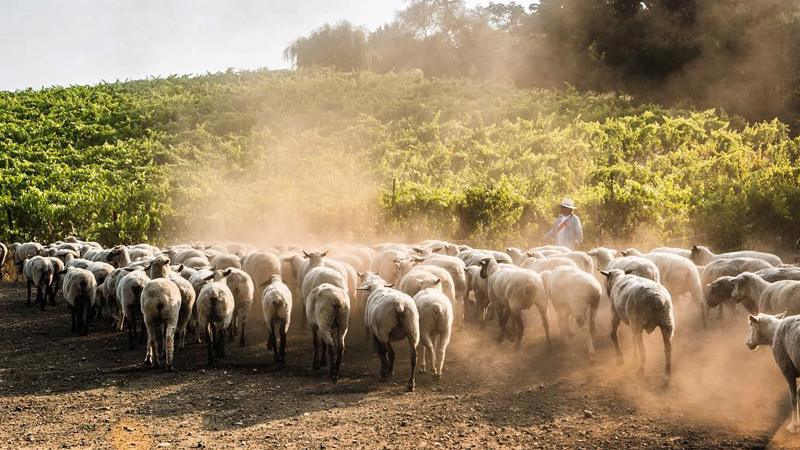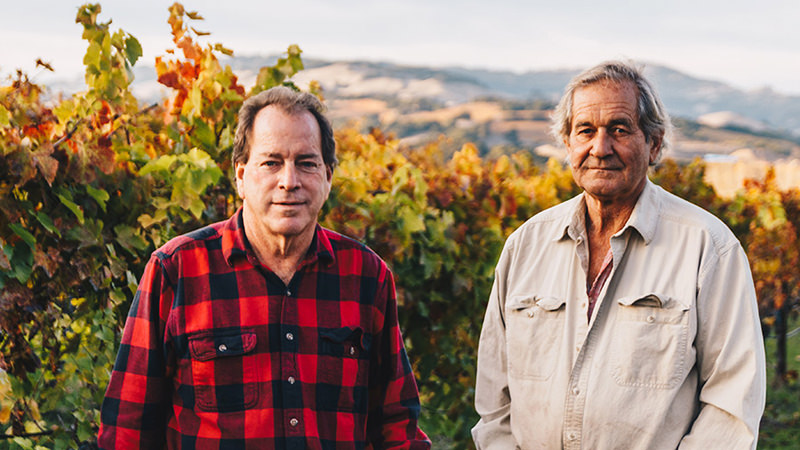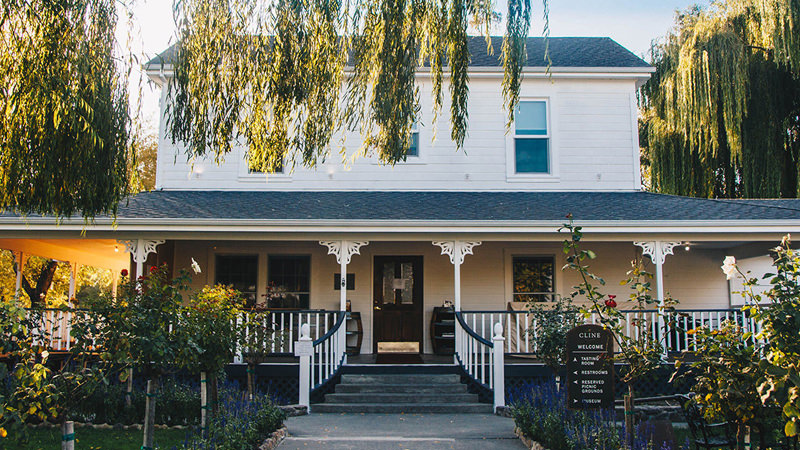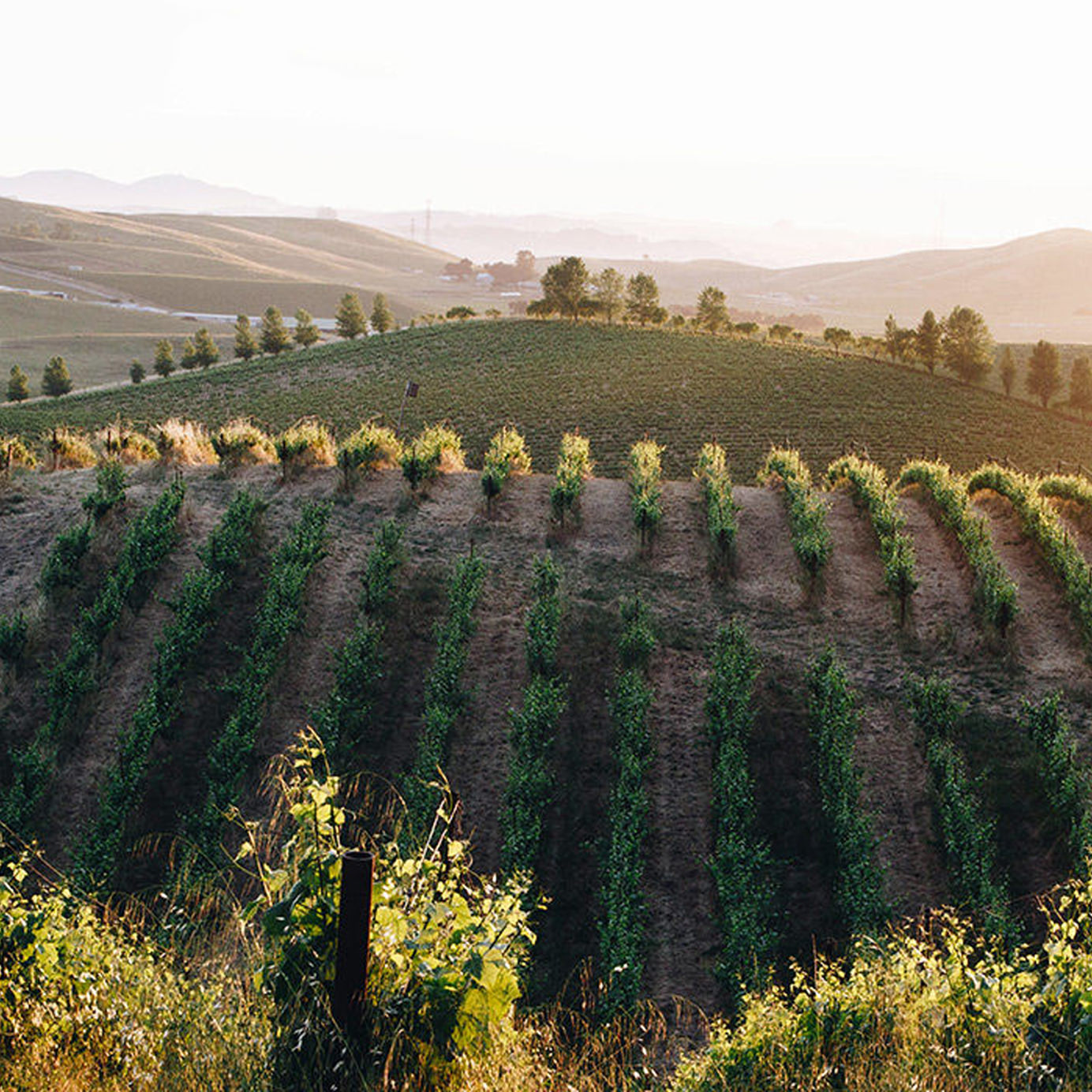At first stroll, the Green String Farm at Cline Family Cellars doesn’t seem different from other agricultural plots in Sonoma wine country. Rows of vineyards cover the landscape, a barn rises on the horizon, and chickens cluck happily in the distance. The place looks, feels, and sounds like Sonoma.
But then, if you’re lucky, you’ll see them. The sheep.
Mewing and grazing, a happy herd marches through Cline’s vineyard, undeterred by the moveable fence that surrounds them. Bit by bit, they cover the land, momentarily turning blocks of green vineyard white as they mow down weeds and munch the canopy of grapevines. They look alarmingly out of place — won’t those animals hurt the grapes? Shouldn’t the sheep graze in an empty field?

If proprietor Fred Cline and his agricultural partner in crime, Bob Cannard, happen to be on the premises, they will smile in the herd’s direction. Sheep are part of their strategy. In fact, embracing an army of four-legged employees is just one part of Cline’s unique approach to sustainable agriculture.
It’s called Green String Farming, and it’s a type of farming focused on reducing inputs and human intervention to grow healthier crops. The overall motto is “50 percent for humans, 50 percent for nature,” meaning a full half of what the Clines do in the vineyard is aimed at improving soil health and biodiversity.
Cannard developed this methodology after working in the commercial nursery business. His responsibly farmed produce has since found its way onto the country’s most prestigious tables, including those at Alice Waters’ Chez Panisse.
What they don’t call it is organic. Cline is one of many vintners across California who have decided responsible farming and a USDA Organic seal are not mutually inclusive.
“I don’t think an agency, which proposes a one-size-fits-all solution, is the smart course for long-term soil health and well-being,” Megan Cline, director of social media and marketing at Cline Vineyards, and Fred’s daughter, says. “It’s a costly process, and we believe the allocation of those funds are better used in actual farming practices.”
At Cline, those practices take center stage. The 1,000-acre estate composts grape skins from harvest and uses crushed rock to nurture the vines and soil itself. It fights pests or disease with natural predators and compost teas.
“We’re going to pay for everything we put into the earth,” Cannard says nonchalantly as he eats salad with his tanned, weathered hands. “We have to build up the soils.”
Building up soils is exactly what Green String has been doing since 2000. The company has gone “beyond organic,” Megan says, actively improving its ecosystem with chemical-free farming.
“My parents would be the first to tell you that making the switch from conventional farming to the Green String Method was incredibly expensive and initially some of our vineyards struggled,’’ Megan says. “But after the initial shock, those vineyards gained strength and are now healthy and thriving.”

Fred grew up farming with his father and founded the winery in the early 1980s, focusing on Rhône varieties. Though best known for its juicy, jammy Old Vine Zinfandel, Cline Vineyards now offers a natural, Farmhouse line of wines and is experimenting with amphorae aging.
Inside and out, there are no pesticides or additives in sight. The Clines believe this is far more important than certification. “When you’re certified organic,” Fred says, “they let you use things we’d never use in our vineyards,” such as highly concentrated fertilizers.
USDA organic certification is confusing and expensive for farmers. And for wine drinkers, it’s doubly confusing, in part because the USDA classifies organic grapes and organic wines differently. Due to USDA labeling practices, the term “organic grapes” can legally be used on a heavily modified bottle.
For example, let’s say your grapes spend an entire season being nurtured solely by Mother Nature. Then, you chemically modify them with substances like sulfur, acids, and 70 other chemicals approved by the USDA before bottling. Your modified juice will still carry an “organic grapes” sticker on the label.
The National List of Allowed and Prohibited Substances for organic crop production also states exceptions will be made when the allowed methods are “insufficient to prevent or control the target pest.”
Similarly, many noxious winemaking chemicals are considered organic because they exist is low concentrations in nature — like microscopic amounts of arsenic in pears or formaldehyde in dried shiitake mushrooms, for example. Synthetic additives are prohibited in organic winemaking, of course; but the USDA elements like sulfur or color additives sneak through “organic” loopholes because they’re concentrated versions of “natural” elements.
Sometimes, these additives might simply be nutrients that help fermentation occur at a speedy pace. Other times they are complex coloring agents and acids that modify a wine’s flavor dramatically.
All told, these loopholes leave lots of room in the wineries and fields for chemicals none of us want to consume.
“We all need to be proactive about making sure that the products and produce we are getting match what our definition of sustainable is,” Megan says, noting that despite its ties to cancer, Roundup is a common ingredient in many “sustainable” farming regimens.
“You can believe what we are about or not,” Cannard says. “But hopefully you’ll taste the clarity of what we do in the wines and in the food.”

Across the Golden State, many of the Clines’ neighbors are embracing sustainability. Bouchaine Vineyards in Napa employs a falconer to combat root-damaging rodents. Nearby, Kathleen Inman of Inman Family Wines encourages messy landscaping filled with wildflowers to attract pollinators to her Russian River vineyards.
As consumers are increasingly inundated with terms like “natural,” “organic,” and “biodynamic,” clarity and ethics are more important than ever. We vote with our wallets daily, sometimes paying a premium for everything from locally made cheese to responsibly farmed coffee.
Cline’s Farmhouse White lingered in my head for days after I tasted it, and not because it was a $150 bottle. In fact, it sells for around $15. Cline’s Green String methodology proves good-for-the-earth wines don’t have to be bad for our wallets. Some things are truly sustainable.
